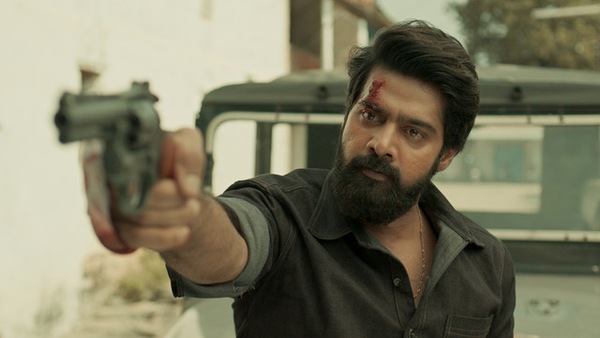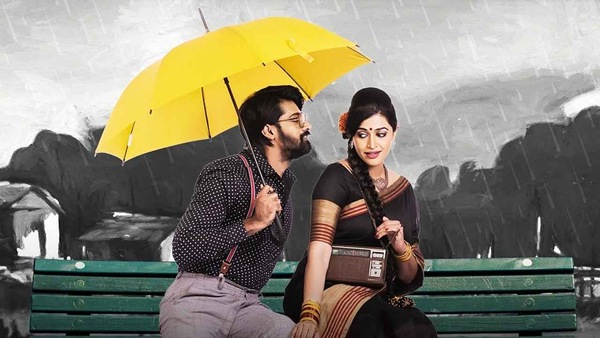Naveen Chandra: “OTT allowed me to be part of a new league of filmmaking”
Actor Naveen Chandra looks back at his roots, discusses what went wrong with his career after a near-perfect launch and his emphatic comeback

Last Updated: 03.50 PM, Jun 11, 2021
Bellary-born Naveen Chandra was the toast of the tinsel town who made the rugged avatar and beard the new cool among male leads in Telugu cinema (of course, only after J D Chakravarthy) when his breakthrough film Andaala Rakshasi hit theatres. Nearly a decade after the film's release, Surya remains one of his most celebrated characters in a diverse career across multiple languages over 14 years. Naveen has had more lows than highs - professionally and personally - and he's only emerged stronger when life has thrown a challenge at him. On the sets, he's that guy who keeps his head low, comes on time, does his job and leaves the set with little fuss. What keeps this workhorse going after all? OTTplay tries to find answers in an interaction that coincides with the release of his latest project Ardha Shatabdham on aha where he plays a fiery cop Ranjith.
You spent a significant part of your life in Bellary. What were your growing years like?
Bellary, despite sharing the border of Karnataka and Andhra Pradesh, is a region where many languages thrive. I lived in a community where people spoke Bengali, Urdu, Telugu, Kannada, Marathi, Odia and this made it easy for us, as kids, to grasp several languages early. I remember my town best for Bhailaata, a storytelling form unique to the region, performed during weekends, where many tales from Ramayana, Mahabharata, events from the lives of rulers like Tipu Sultan came alive. I'd always wanted to be a part of it and this probably triggered the desire in me to become an actor. Hailing from this region helped me nail the Rayalaseema accent in Aravinda Sametha effortlessly.
Hailing from a lower-middle-class family, was there any resistance about your entry into films?
My father, a KSRTC employee, passed away when I was in 10th grade. The responsibility of the family fell on me and my brother's shoulders and we were expected to study well, take up stable jobs. I even took up dance classes briefly and was in charge of choreographing the performances for several school annual day functions. I became a known name in Bellary for the same reason. Though mom knew that I excelled at academics, she realised my destiny was intertwined with the stage. After my elder sister got married, I expressed my interest to go to Hyderabad and pursue a career in films. My brother had just got a job in KSRTC on compassionate grounds and the family situation was getting better. Initial apprehensions apart, I had my way. It's my 14th year in the film industry now and acting is my only bread and butter.
After a spectacular start to your career with Andaala Rakshasi, how did you lose your way?
I didn't know anything about the technicalities of filmmaking when I bagged Andaala Rakshasi. All I knew was acting and that there would be a camera on sets. The offer came by unexpectedly. It felt like all my struggles bore fruit and the almighty had finally listened to me. I just found it overwhelming and didn't know how to handle my career later. There was no guidance and I didn't make the right choices.
How did you bounce back then? You've not at all looked back after Nenu Local.
I think it was the fear of not being successful that helped me overcome my lows. I was relentlessly working in film after film hoping for some light at the end of the tunnel. I had no Godfather in the industry. I once tasted success with Andaala Rakshasi and let things go astray. When I got something like Nenu Local, I learnt my lessons and had to safeguard my career. I had no work for one year before Nenu Local, didn't have a penny and when I tasted success again, I realised the importance of waiting for the right project.
Did you, at any point, think of making a career in Kannada cinema? Being a Bellary boy, Kannada must have come quite naturally to you.
Kannada films only released in a single theatre in Bellary back then. Telugu and Hindi films generally ruled the roost. I wanted to be recognised as a Telugu film hero in my home town and it was natural to gravitate towards Tollywood. My mom hails from Secunderabad and the Telugu links were strong in my family. They call me 'Bellary hero' even today. Many Kannada offers came my way after Nenu Local, but I am in no hurry to make my debut there and want to do it with the right project.

Unlike your aggressive characters in the angry-young-man zone, Bhanumati Ramakrishna revealed a tender, innocent side to you. How did you achieve this transformation?
To get a role like Ramakrishna right, it was important to understand his state of mind. I observed the many 'Ramakrishnas' in our lives, say a watchman who addresses you with a smile regardless of what he's going through. I even took a reference from my brother who balanced work, family and responsibilities from a young age sans any fuss. There are many such honest, simple people around us and all I had to do was to observe their lifestyle. The film's director Srikanth Nagothi drew me into his world seamlessly. Who wouldn't lap up a 'full-meal offering' like Bhanumathi Ramakrishna? I have many more interesting films in the pipeline. I am calm, cool and excited about it.
We hear that the character (Ranjith) you play in your latest release on aha, Ardha Shatabdham, is based on a real-life cop named Umesh Chandra. Does it help for an actor to have ready references?
With a real-life reference, you need to mirror the spirit of the character and not merely focus on his appearance. Umesh Chandra was apparently filled with bitterness falling prey to the diktats of his superiors, having been asked to kill many people for political reasons. He felt trapped in the system that's essentially in place to serve people. I brought my own flavour to the role and didn't try to imitate him. It's an intense role and I hope people like it.
Lead roles, negative roles, supporting parts and special appearances - you’ve managed to garner enough variety.
Even in the days of Andaala Rakshasi, I didn't want to get stuck with labels and hoped to do all kinds of roles. Not many remember that I did a film called Dalam immediately where I didn't play the conventional lead role. I looked for many roles like that initially, but trends were different back then. Even during my low phase, I took up films like Lakshmideviko Lekkundi and Tripura because I thought it would widen my horizons. The choices have paid off eventually and I’m happily grabbing the best I get regardless of the tag now.
What is the biggest change that the OTT industry has brought about?
For someone like me, who at a point wasn't sure of what the openings of his film might be or if it would get enough theatres, it took a lot of years of toil, multi-starrers, projects with accomplished directors, to find a footing in feature films and gain credibility. Going from there, OTT allowed me to be part of a new league of filmmaking. BhanumathiRamakrishna and Super Over on aha have been my game-changers. I don't know if so many people would've had watched these films in theatres. Bhanumathi Ramakrishna opened doors for me to be a part of Gharshana, a massive OTT project bankrolled by the makers of Baahubali. Ultimately, as an actor, you want to be noticed for good work and OTT has enabled me in that. I am enjoying balancing between big-screen films and OTT offers.
After 14 years of being in the industry, what does it take to survive amidst this madness?
Good education is a must if someone aspires to enter the industry. You think better, communicate better and understand what people expect from you. It helps you develop a work ethic. Millions dream of being an actor and they get to live so many roles in a lifetime - a cop, a boxer, a gangster, a corporate employee and what not. One needs to gather knowledge from all possible sources and know a bit of everything to be an actor. Directors may ask you to play any role and it helps to have background knowledge.

 Premium
Premium